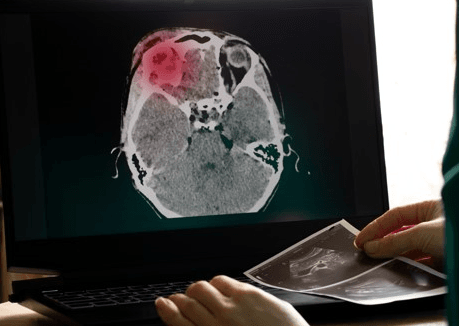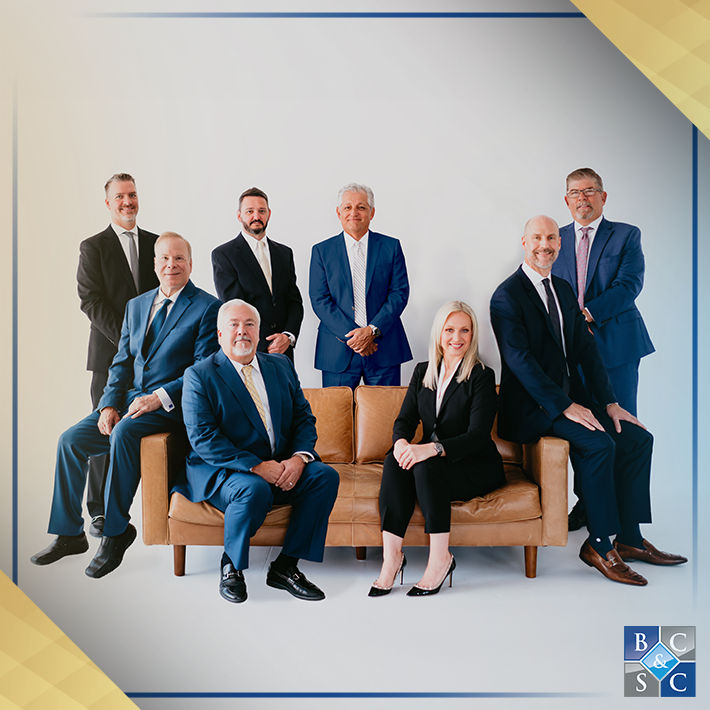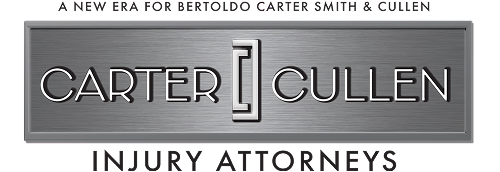Brain Injuries
Las Vegas Brain Injury Attorneys
Handling Traumatic Brain Injury Cases in Nevada

On This Page:
What is the Most Common Cause of Brain Injuries?
Any type of trauma to the head can cause a traumatic brain injury, which means there are numerous causes for them. However, there are accidents and incidents that tend to cause them more often than not.
According to the CDC, the leading causes of TBI include:
- Slip and fall accidents, which cause 28% of traumatic brain injuries
- Motor vehicle accidents, which cause 20% of TBIs
- Struck by/against events (or struck by object accidents), which cause 19% of TBIs
- Assaults, which cause 11% of TBIs
- Construction accidents
- Sports accidents
When it comes to motor vehicle collisions, motorcycle riders have a high risk of suffering brain injuries when compared to another motorist. Many safety groups like the National Safety Council (NSC) estimate that a motorcyclist is at least 10 times more likely to suffer a TBI in a crash because they have such a limited amount of protection from impacts. Although this risk can be lessened by wearing a properly fitted helmet, there is no guarantee that it will prevent a brain injury entirely.
Why You Should Not Ignore a Head Injury
Where brain injury is mild, your symptoms may disappear with immediate medical attention and you may be able to resume your usual tasks without any difficulty. The problem with head injury, however, is that signs of external injury can mislead accident victims into thinking that they are fine – and consequently they do not seek further tests and treatment.
In many cases, the force exerted upon the head can result in brain bleed that does not manifest outward physical symptoms. In the meantime, the internal bleeding can push against the brain, causing it to swell and further limit blood flow to it. When this happens, you may experience symptoms such as nausea, glossy eyes, sudden sleepiness and severe headache.
Immediate treatment which includes emergency surgery is vital because the damage can progress quickly and become irreversible.
It is recommended that you seek immediate medical attention if you or someone you know experiences any of the following symptoms:
- Sensory impairment
- Headaches
- Paralysis
- Seizures
- Vomiting
- Difficulty with balance
If you or another person is showing any of the above signs of a brain injury or has suffered obvious head trauma, call 9-1-1 right away.
What Should You Do Following a Brain Injury?
One of the most important things you can do following a brain injury is to seek medical attention immediately. Early treatment can prevent further injury and can help speed up the recovery.
Signs and symptoms to look out for include:
- A blank stare
- Changes or delays in motor or verbal responses
- Headache
- Temporary loss of consciousness
- Confusion
- Dizziness, nausea or vomiting
- Ringing in the ears
- Extreme fatigue
- Sensitivity to light and noise
Depending on the symptoms, the hospital might conduct tests such as a CT scan or MRI. And, depending upon the severity of the brain injury, the patient may be held in the hospital overnight. If you’ve suffered a brain injury, it is important to follow the doctor’s instructions and to get plenty of rest. Working and participating in everyday activities may be difficult at first; take your time and try to focus on one thing at a time to avoid distraction.
Some things you can do to ensure the recovery process goes smooth include:
- Pay attention to your body (when you are tired, for example, be sure to get plenty of rest)
- Avoid exercise and activities that are physically demanding
- Avoid activities that could possibly lead to another head injury
- Listen to your doctor about when you can participate in daily activities and when you can return to work
- If you are having difficulty remembering things, write things down and try not to get frustrated
- Try not to do too many things at once to avoid being distracted
- Do not use the computer for long periods of time
- Do not drink alcohol or take any medications other than those prescribed by your doctor
Can I Get Financial Help to Pay for Brain Injury Treatment?
Unfortunately, there is no known cure for brain injuries, but advances in medical technology have allowed for better treatment and long-term care options that help mitigate the damage and help improve the injured person’s quality of life. With the help of medical treatment and ongoing rehabilitation programs, brain injury victims can slowly heal from their injuries and move forward with confidence—but these treatments cost money.
Brain injury healthcare costs are some of the most expensive in the country, which is why it is important to talk with a Las Vegas brain injury attorney after suffering a head injury. An attorney can help you seek compensation from the liable party so you are not left paying for costly brain injury care out of your own pocket. Each person who suffers a brain injury will have unique medical needs. We can help determine the full cost of your injury, including projected future expenses, in order to build a case that meets all of your recovery needs.
In Las Vegas, brain injury victims may be eligible for various forms of assistance. If the injury was work-related, workers’ compensation might cover some expenses. Additionally, victims can explore the possibility of claiming insurance benefits and might be eligible for government aid programs that provide some level of relief. Our attorneys at Bertoldo Carter Smith & Cullen are well-versed in identifying all potential sources of financial support.
Learning to Cope With a Brain Injury
Learning to cope with a brain injury can be difficult. You may be confused, frustrated and depressed. There are some things you can do to help you cope with your brain injury, including:
- Join a support group: ask your doctor or rehabilitation therapist for a recommendation. Talking to other people who are going through something similar may be helpful. You may learn some new coping strategies.
- Try to maintain a routine to avoid confusion.
- If you are having difficulties remembering things, write things down (e.g. people’s names, phone numbers, etc.).
- Pay attention to your body and take breaks when you need to so you don’t overdo it.
- The number one most important thing is to get plenty of sleep so your brain can heal.
Adjusting to a new way of life may also involve professional therapy, such as cognitive or occupational therapy, to aid in regaining skills that may have diminished. Engaging with these professionals can provide tailored strategies specific to your needs and condition. Moreover, setting realistic short-term goals can assist in monitoring improvement and encouraging a positive mindset during the recovery process.
What Are the Long-Term Effects of a Brain Injury?
Research shows that the possible long-term effects of a traumatic brain injury include:
- Memory loss
- Difficulty with language
- Attention and learning issues
- Fatigue
- Depression
- Mood swings
- Anxiety
- Anger
Handling these effects often requires ongoing support, both medically and socially. Regular check-ins with healthcare providers can help monitor changes and adjust treatments as needed. Additionally, family support plays a crucial role in adapting to these challenges, providing the emotional and physical support necessary for ongoing recovery. Incorporating assistive technologies and modifications in daily living environments can also promote a safer, more manageable lifestyle for those affected.
Brain Injury Statistics
Interesting brain injury statistics include:
- There are approximately 2.5 million brain injuries of varying severity each year.
- Nearly 300,000 hospitalizations each year throughout the U.S. are caused by brain injuries.
- 50,000 deaths occur annually due to fatal brain injuries or TBI complications.
- More than 90,000 long-term disabilities are caused by a TBI each year.
- More than 5.3 million Americans need help performing day-to-day activities due to living with TBIs.
- Men are 1.5 times more likely than women to suffer a traumatic brain injury, which might be related to increased enrollment in high contact sports and military service positions.
- Children under the age of 4 and teenagers ages between 15 and 19 have an inordinately higher chance of suffering a brain injury compared to other age groups.
- The total cost of TBIs each year in the U.S. is approximately $60 billion when factoring in medical bills and lost productivity.
Understanding these statistics emphasizes the widespread impact of brain injuries and the importance of being informed about prevention and treatment options. Until recently, traumatic brain injuries were often underestimated. However, with growing public awareness and better diagnostic methods, more individuals now receive the care they need. Our team at Bertoldo Carter Smith & Cullen is dedicated to advocating for brain injury victims, ensuring they have access to supportive resources and informed legal counsel.
The Legal Process for Brain Injury Claims in Las Vegas
The legal process for brain injury claims in Las Vegas involves several crucial steps. Initially, victims or their families should seek the guidance of an experienced brain injury attorney who can provide personalized advice based on Nevada’s specific legal framework. Once representation is secured, the attorney will conduct a thorough investigation to collect evidence such as medical records, witness statements, and accident reports, which are critical in establishing the defendant’s negligence or fault.
Frequently Asked Questions
What Should I Do Immediately After Suffering a Brain Injury in Las Vegas?
After suffering a brain injury in Las Vegas, it’s critical to prioritize your health and safety. First, seek immediate medical attention, even if symptoms seem minor. Brain injuries can be deceptive, with symptoms potentially worsening over time. After addressing immediate health concerns, document all details about the incident as soon as possible, including taking photos, recording witness accounts, and keeping a secure record of all medical consultations and treatments. It is equally important to contact a knowledgeable brain injury lawyer in Las Vegas who can help guide you through the subsequent legal and insurance processes. Understanding your rights and having professional representation can alleviate burdens and focus on recovery.
How Do Las Vegas Courts Handle Brain Injury Cases?
Las Vegas courts handle brain injury cases meticulously, with a strong emphasis on comprehensive evidence and expert testimonies. Typically, these cases are heard in the Eighth Judicial District Court, which serves Clark County. Court procedures can be complex, involving pre-trial motions, discovery processes, and possible mediation before going to trial. In Nevada, the need to prove negligence or liability is crucial. Hence, the representation by experienced attorneys equipped to navigate local legal nuances and effectively communicate the complexities of a brain injury is vital. Our team provides strategic guidance ensuring your case is built on strong legal grounds, maximizing the potential for favorable outcomes.
What Compensation Can I Seek for a Brain Injury in Las Vegas?
Victims of brain injuries in Las Vegas may seek compensation for various damages. Compensatory damages often cover medical expenses, both current and future, which can be extensive in brain injury cases. Victims can also claim lost wages if the injury impairs their ability to work, as well as damages for pain and suffering. In some cases, punitive damages are applicable if willful negligence is proven. Understanding the full extent of potential compensation requires the expertise of a seasoned attorney who can account for all economic and non-economic impacts of the injury. At Bertoldo Carter Smith & Cullen, we systematically evaluate all aspects of your case to outline a comprehensive compensation claim.
Contact Us Today
Request a Free Consultation
Our Promise to You
Why You Can Count on Our Firm
Experience You Can Trust
Legacy of Client Satisfaction
Client-Centered Approach
Proven Record of Results
Client testimonials
Real Stories From Real Clients
"Thank you seems woefully inadequate”
“Seamless and caring service.”
“They truly care about their clients.”
“Handled my case excellently.”
“Best with phenomenal work ethics.”
“Great settlement and so happy with results!”
“Utmost in professionalism”
“They always made me feel like a member of their family and not just a client.”

A PROVEN RECORD OF RESULTS
Millions of Dollars Recovered for Our Clients
$100 MILLION
Product Defect And Fatality From Helicopter Crash
$30 MILLION
Fatality/burn Disfigurement From Helicopter Crash
$19.5 MILLION
Brain Damage From Motor Vehicle Accident
$18.5 MILLION
Wrongful Death From Aircraft Accident
$16 MILLION
Motor Vehicle Accident, Mild Traumatic Brain Injury
$12 MILLION
Negligence Security Leading To Sexual Assault
$10.8 MILLION
Brain Injury, Premises Liability
$10 MILLION

